Lucy Komisar
|
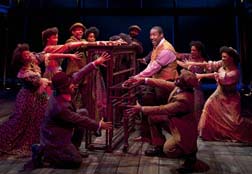 |
| "RAGTIME" -- Quentin Earl Darrington & cast. Photo by Joan Marcus. |
The power and sweep of "Ragtime" take your breath away. The mix of true history and invention yields a bittersweet story anchored in the panorama of American history.
It is the early 1900s in New Rochelle. The upper-class white family and their friends — dressed in white — cakewalk and sing of their bucolic lives in the Westchester suburbs. We learn, through Lynn Ahrens's lyrics, that there were ladies with parasols, fellows with tennis balls, but, "There were no Negroes." Not in New Rochelle.
Shift to Harlem, where Coalhouse Walker Jr. (Quentin Earl Darrington) is playing ragtime for pulsating black dancers.
"And there were no immigrants." The set is a multilevel iron structure that invokes Pennsylvania Station which was completed in 1910 and was called a "civic masterpiece."
 |
| Robert Petkoff as Tateh, Sarah Rosenthal as his daughter, and other immigrants. Photo by Joan Marcus. |
Above, on a high walkway, a stream of new arrivals swathed in dark clothes and clutching bundles moves wondrously into a new world. Harry Houdini (Jonathan Hammond), born the Jew Eric Weiss in Austria, drops in from the sky, upside down.
And the militant Emma Goldman (Donna Migliaccio) denounces the capitalist exploiters, J.P. Morgan (Michael X. Martin) and Henry Ford (Aaron Galligan-Stierle).
That's just the opening of this inspiring revival of the musical by Terrence McNally, based on E.L. Doctorow's 1975 novel. Marcia Milgrom Dodge has directed and choreographed it with poetry, style and elegance, pulling together the strands of Doctorow's interwoven narratives so that the pastiche makes a rich fabric of early 20th-century America.
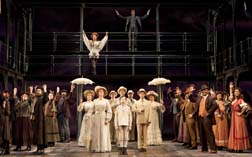 |
| The cast: immigrants, prosperous whites and blacks. Photo by Joan Marcus. |
The characters are meant as symbols, as the play mixes real people with invented ones, true events with imaginary ones. The fictional people come from three families—upper-middle class, white Anglo-Saxon Protestants, immigrant socialist Jews from Latvia, and Harlem blacks. They represent American dreams: the woman who feels hemmed in by her status as a wife, an immigrant hoping for a better life, a black man seeking equality.
The sound and beat that backdrops the story is ragtime, a new music that represented new attitudes. It was a metaphor for Doctorow, who said that taking the imagery of a rag bin of threads and tatters of images and ideas, he wanted to look at the disparate, conflicting and intersecting strands of humanity that made up America at the turn of the century. It was a time when European immigration peaked, as in 1907, 1.2 million immigrants arrived at Ellis Island. Labor struggles were endemic. Racism was virulent.
The dramatic vignettes are interspersed seamlessly as the story builds to interconnect the lives of the rich whites, the blacks, the immigrants to create one fabric. The story is gripping.
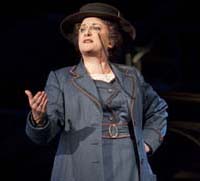 |
| Donna Migliaccio as Emma Goldman. Photo by Joan Marcus. |
The interweaving of the true and invented give the play both a personal emotion and the verisimilitude of reality, each strand strengthening the other. McNally is faithful to the story and to what Doctorow wanted to say. It is a masterful combination.
Real figures include Emma Goldman, powerfully drawn by Donna Migliaccio, as the radical union organizer speaking for the rights of workers, including the immigrants who traded bad times in Europe for misery on the Lower East Side. Her Union Square rally is broken up by violent police.
She had her work cut out for her in this time of industrialization and the assembly line. J.P. Morgan wears a top hat and fur lapel, while workers struggle to get their fair share. Doctorow's hero Tateh (Robert Petkoff) arrives from Latvia, but leaves the jobless Lower East Side for a mill in Lawrence, Mass. Striking workers there are attacked by thugs and cops.
 |
| Savannah Wise as Evelyn Nesbit and vaudeville dancers. Photo by Joan Marcus. |
Meanwhile, elsewhere, frivolity reigns. Evelyn Nesbit (played with sharp humor by Savannah Wise), the chorus-girl wife of millionaire Harry Thaw (Josh Walden), who inherited a coke and railroad fortune, finds fame in a sex scandal. Thaw kills architect Stanford White (Mike McGowan), who had once been Nesbit's lover.
The trial filled the tabloids, and Evelyn milks it in a vaudeville act. Mother's Younger Brother (Bobby Steggert) falls in love with Nesbit, but then goes to the Goldman rally. Steggert is appealing as the young fellow who has compassion for the suffering workers and swaps frivolous infatuation for radical politics.
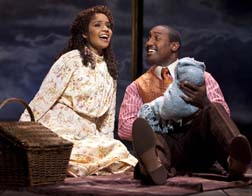 |
| Stephanie Umoh as Sarah, Quentin Earl Darrington as Coalhouse. Photo by Joan Marcus. |
In the race strand, Doctorow's ragtime pianist Coalhouse has fallen in love with Sarah (Stephanie Umoh),given shelter by Mother (Christiane Noll) while Father (Ron Bohmer) is away with Admiral Peary on an expedition to the North Pole. Returning from New Rochelle in his Model-T, Coalhouse is stopped by racists of the Emerald Isle fire house, who set in motion heartbreaking events that destroy his dreams. He vows revenge.
We hear the Negro leader Booker T. Washington (Eric Jordan Young) preach non-violent forbearance and see the dénouement occurs symbolically at J.P. Morgan's Library on Madison Avenue and 35th Street.
The story shows the tragedies that ensued during the struggle for justice. But it also points to the transformative power of the new world. Mother challenges patriarchy.
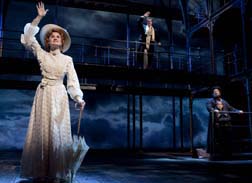 |
| Christiane Noll as Mother, Ron Bohmer as Father, Robert Petkoff as Tateh, Sarah Rosenthal as his daughter. Photo by Joan Marcus. |
She sings, "I was content, a princess asleep and enchanted. If I had dreams, then I let you dream them for me." Those were "the days when I let you make all my choices." She recalls, "I was your wife. It never occurred to want more." But, "We can never go back to before." Now, everything is possible.
The singing is first rate, including Mother/Noll's bell soprano, Father/Bohmer's tenor and Booker T. Washington/Young's excellent baritone. Migliaccio is especially strong as Emma Goldman, Darrington, rent by fury, and Umoh, driven by desperation, are a moving couple as Coalhouse and Sarah.
Stephen Flaherty's music expertly describes the characters and the mood. There is a charming jazzy idiom of ragtime and gospel. They are interspersed with anthems, operetta-style waltzes and genteel parlor songs. The choreography is bright and memorable, mixing the styles of the different social groups till they are woven into a new 20th century fashion. This is one of the important plays of American musical theater.
| lobby | search
| home | cue-to-cue |
discounts | welcome | film
| dance | reviews
|
| museums |
NYTW mail | recordings |
coupons | publications |
classified |

